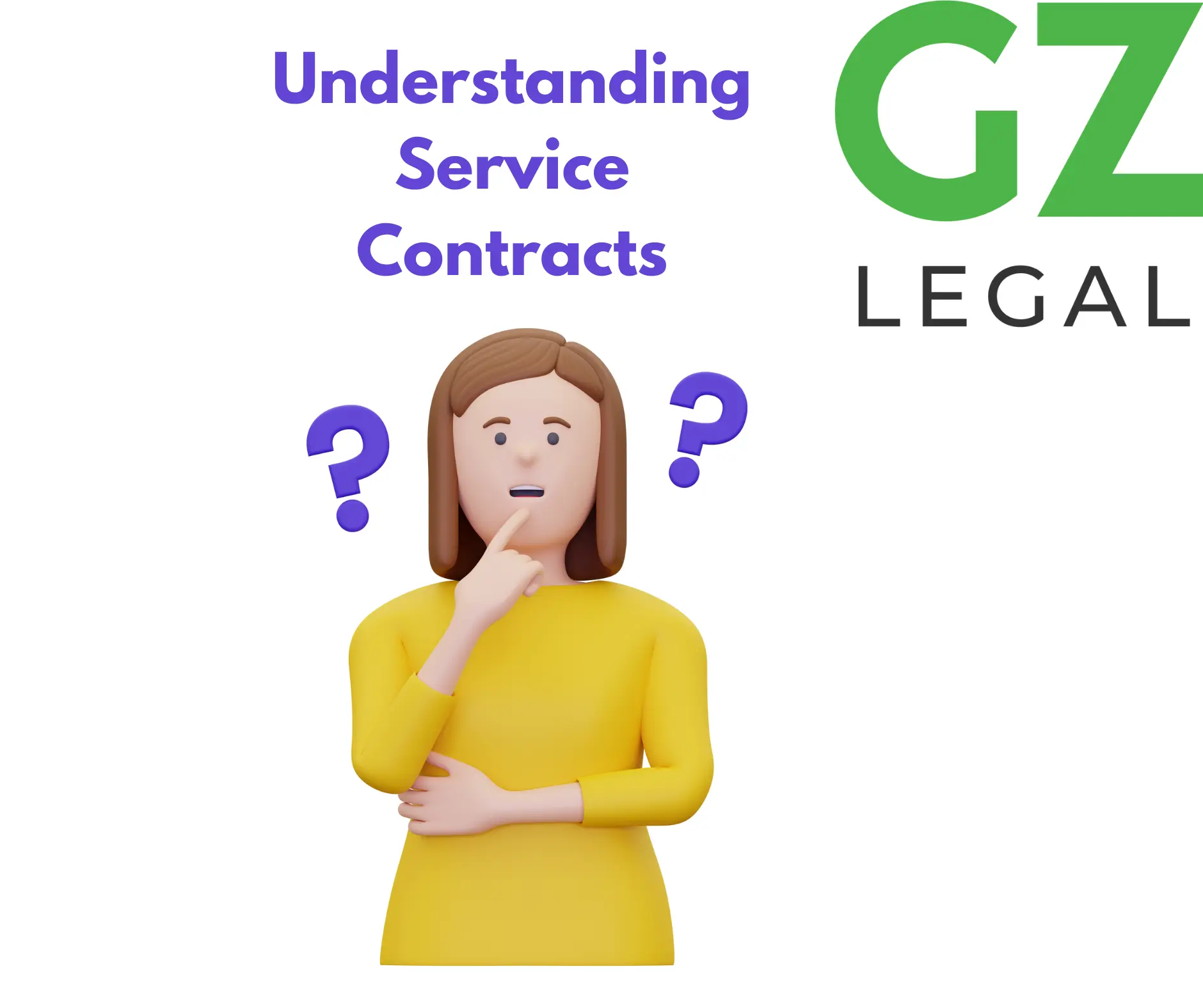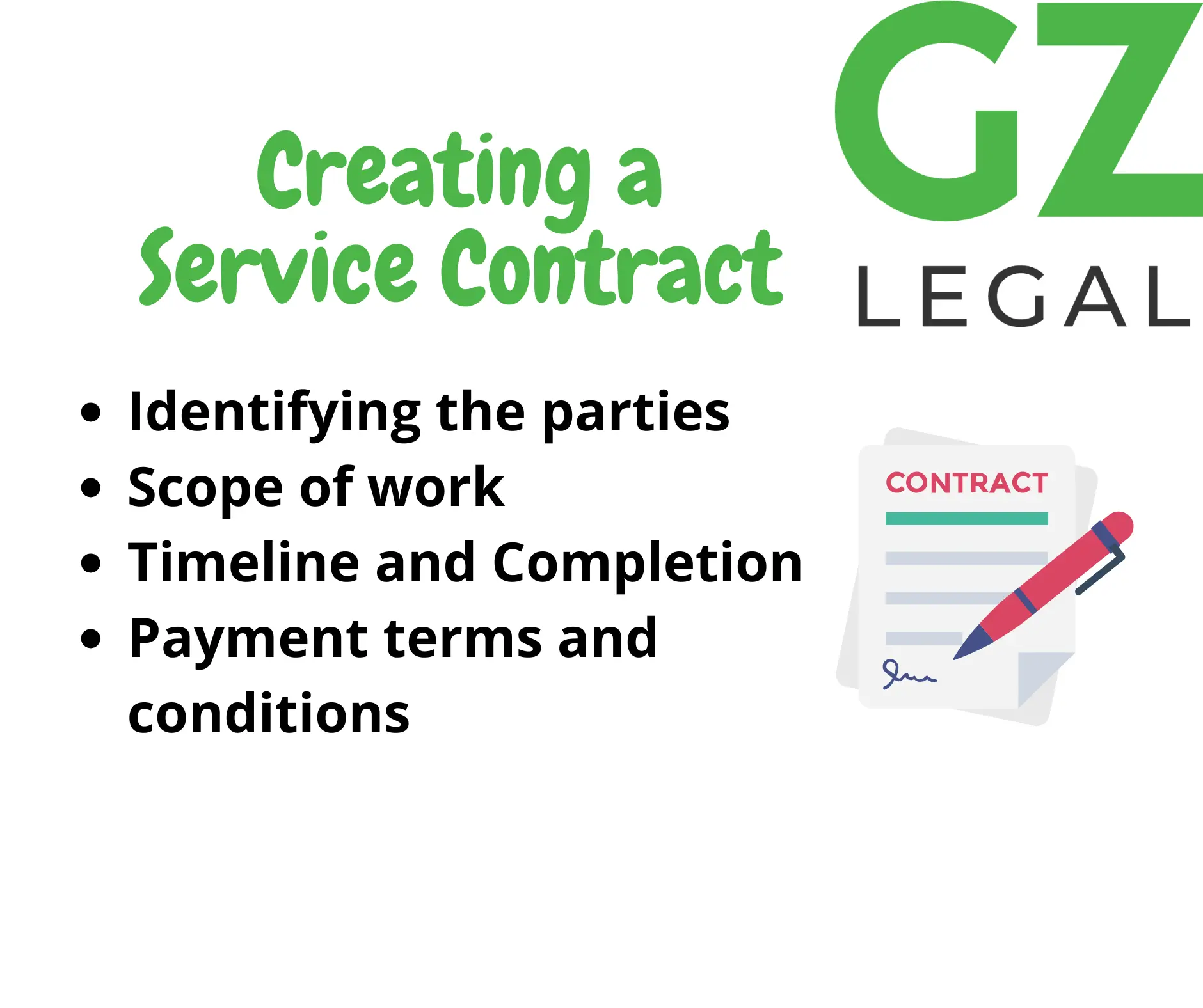Malcolm ZoppiSun Oct 15 2023
What is a Good Service Contract? Essential Elements Explained
A good service contract clarifies terms, conditions, and expectations for both parties.
What is a Good Service Contract? Essential Elements Explained

A service contract is a critical component in any business relationship, as it outlines the terms, conditions, and expectations between the service provider and their client. A good service contract not only clearly defines the scope of services to be provided and associated payment terms but also minimises the likelihood of misunderstandings or disputes. By comprehending the essential elements and legal considerations of these agreements, both parties can safeguard their interests and foster a mutually beneficial collaboration.
In order to create an effective service contract, it is crucial to determine the roles and responsibilities of each party involved create a service contract. This includes outlining the specific services to be rendered, establishing a timeline for project completion, and addressing any confidentiality or non-disclosure agreements. An understanding of the various types of service contracts can also enhance the versatility of your agreements, catering to unique business relationships and circumstances.
Key Takeaways
- A good service contract clarifies terms, conditions, and expectations for both parties
- Determining roles and responsibilities in the contract helps maintain a seamless collaboration
- Understanding different types of service contracts allows for tailored agreements in diverse business settings
Understanding Service Contracts

Definition of a Service Contract
A service contract is a legally binding agreement between two parties that outlines the services to be provided and the associated payment. These contracts are used across various industries, such as education, healthcare, construction, and IT. Unlike contracts for goods, service contracts tend to be utilised by consultants, freelancers other service providers, and contractors.
In a service contract, you’ll find details such as the timeline for completion, confidentiality agreements, terms of payment, and other specific conditions related to the specific service done. When entering a service agreement, it is essential to have a clear and comprehensive outline to ensure both parties understand their responsibilities and manage expectations.
Importance of a Service Contract
Service contracts hold significant value in the world of business and work for many companies for various reasons:
- Clarity: A well-drafted service contract clearly defines the scope of the services, responsibilities, and expectations for both parties. This helps avoid misunderstandings and miscommunications that may lead to disputes or poor service delivery.
- Protection: The contract provides legal protection for both parties in case of breach, non-performance, or disputes arising from the service rendered. It outlines the repercussions and remedies if either party fails to meet their obligations.
- Payment: A service agreement stipulates the payment terms, which could include pricing, payment schedules, or milestones for services rendered. This ensures timely and accurate compensation for the service provider and gives the client a clear understanding of their financial obligations.
- Professionalism: Service contracts showcase a high level of professionalism and commitment to quality work. A well-written contract demonstrates that you take your business seriously and have considered all potential risks and scenarios that may arise.
By understanding the definition and importance of a service contract, you’ll be better equipped to create a comprehensive and well-structured service agreement, protecting your interests while fostering a successful business relationship.
Creating a Service Contract

Identifying the Parties
When creating a service contract, you need to clearly identify the parties involved in legal contract – the service provider and the client. Use their full legal names and addresses to avoid any confusion or ambiguity. Ensure that each party’s role and responsibilities are defined accurately.
Scope of Work
In your service providers’ contract, outline the scope of work to be provided by the service provider. This section is vital for setting expectations for both parties. Include a detailed description of the work, its purpose, and any relevant specifications or requirements. If needed, you can use bullet points for clarity.
Timeline and Completion
Establish a timeline for the completion of the services. This section should include the start date, end date, and any milestones or deadlines that the service provider must meet. Both the service provider sign the parties should agree on a reasonable timeline for the work, taking into account any unforeseen circumstances that could cause delays.
Payment Terms and Conditions
Lastly, specify the payment terms and conditions for the service contract. Detail the fees, deposit, payment structure (such as a flat fee or hourly rate), and payment schedule. Also, include any contingencies related to payment, such as bonuses for early completion, penalties for late completion, or conditions under which either party can terminate the contract.
By carefully addressing these aspects in your service contract, you can ensure that both parties are on the same page regarding their expectations, responsibilities, and obligations throughout artist service contract for the duration of the agreement.
Key Elements of Service Contract

Confidentiality and Non-Disclosure
In a service contract, maintaining confidentiality is crucial. You need to include a clause that outlines the level of confidentiality expected and the corresponding responsibilities of each party. This non-disclosure agreement prevents sensitive information from being disclosed or misused, thus protecting your interests and maintaining trust between parties. Ensure that the scope of confidentiality is clearly defined and any exceptions or permitted disclosures are outlined.
Intellectual Property Rights
Your service contract should address the issue of intellectual property rights, which concern the ownership and usage of any inventions, products, or materials that may result from the services provided. Clearly specify the terms under which these rights will be assigned or transferred to the client or remain with the service provider. Take note of any pre-existing intellectual property and ensure the rights of each party are protected.
Indemnification and Liability
A vital part of a service contract is the indemnification and liability clauses. This covers your obligations and responsibilities for the quality and performance of your services, as well as compensation for any damages, losses, or expenses that might arise from errors, neglect, or breaches of the contract. Clearly outline each party’s indemnification responsibilities and any limits on liability, such as caps on damages or exceptions for certain scenarios.
Dispute Resolution
Lastly, your service contract should specify the mechanisms for resolving disputes. In case of any disagreements throughout the execution of the contract, having a dispute resolution process in place can streamline the process and save time and effort for both parties. This could include methods such as negotiation, mediation or arbitration, and should establish the applicable law and jurisdiction for any legal matters arising from the contract.
By incorporating these essential elements into your service contract, you can better protect yourself and ensure a clear and efficient working relationship with your clients.
Roles and Responsibilities

In a good service contract, it’s crucial to define the roles and responsibilities of both the service provider and the client. Clear expectations help avoid misunderstandings and ensure a smooth working relationship between both parties.
Service Provider Responsibilities
As a service provider, it’s your responsibility to deliver the agreed-upon services to your client. This often includes:
- Defining scope of work: Clearly outline the services being provided, along with any deliverables and deadlines.
- Quality assurance: Ensure that your services meet the quality standards agreed upon with your client.
- Meeting deadlines: Complete the tasks and deliverables within the specified timeframes.
- Communicating progress: Keep your client informed about the status of the project and any potential issues or delays.
- Resolving issues: Address any concerns or problems that arise during the course of the project and find a suitable solution.
- Invoicing and payment: Issue invoices to your client in a timely manner and follow up on outstanding payments.
- Compliance: Adhere to any laws, regulations, or industry standards that are applicable in your field.
Client Responsibilities
As a client, it’s your responsibility to collaborate with the service provider in order to achieve the desired outcomes. This includes:
- Providing necessary information: Give the service provider all the pertinent details, documents, and resources needed to complete their work.
- Defining expectations: Be clear about your goals and objectives for the project and communicate any specific requirements you may have.
- Timely feedback: Respond to the service provider’s updates, queries, and requests for approval within an appropriate timeframe.
- Payment: Remit payments according to the agreed-upon schedule and terms.
- Dispute resolution: Work with the service provider to address and resolve any conflicts or disagreements in a professional manner.
- Maintaining a professional relationship: Treat the service provider respectfully, and uphold the terms and conditions set out in the contract.
By understanding and fulfilling your respective roles and responsibilities, both the service provider and the client can ensure that the contracted work proceeds smoothly. This will contribute to a successful project outcome and a positive working relationship between both parties.
Legal Considerations

Contract Enforceability
To ensure a service contract is enforceable, you and other party must make sure that it contains all the necessary elements for it to be legally binding. These elements include an offer, acceptance, consideration, intention, and capacity. Both parties should clearly understand and agree to the terms and conditions set out in the contract. If any of these elements are missing, it can render the contract invalid, leaving you and your business open to potential legal action.
Legal Requirements
When drafting a service contract, it’s essential to comply with all relevant laws and regulations. You may want to consult a lawyer to help you navigate any legal intricacies and ensure your agreement meets all necessary requirements. Some key legal aspects to keep in mind include:
- Ensuring the contract meets the “fairness test,” meaning the wording doesn’t unfairly favour one party over the other
- Outlining clear and transparent terms and conditions to avoid ambiguity or misinterpretation
- Clearly defining your rights, responsibilities, and obligations within the scope of the agreement
It’s also important to avoid any default terms that might be deemed unfair or redundant. By adhering to these legal requirements, you and company can minimise the risk of disputes and potential legal action.
Contract Termination
In your service contract, it’s crucial to address the conditions under which the agreement can be terminated. This might include reasons such as:
- Breach of contract by either party
- Failure to perform the agreed-upon services within a specified timeframe
- Mutual agreement to end the contract
You should also include any relevant notice periods, outlining for example how much notice must be given by either party before terminating the contract. This can help to protect both parties’ interests and ensure a smooth transition if termination becomes necessary.
By addressing these legal considerations when drafting your service contract, you can be more confident that your customer agreement itself is clear, enforceable, and compliant with all relevant laws and regulations, ultimately protecting your business interests and minimising potential risk.
Types of Service Contracts
Independent Contractor Agreement
An Independent Contractor Agreement is a type of service contract that is used when hiring a self-employed individual, such as a freelancer or consultant, to carry out services for you. This agreement specifies the terms and conditions of the working relationship, ensuring that both parties understand their responsibilities and obligations. In this contract, you can outline the scope of work, payment terms, and other relevant details to avoid any future misunderstandings or disputes.
Consulting Service Agreement
A Consulting Service Agreement is a specific type of service contract that focuses on engaging the expertise of a consultant or an advisory professional to provide you with their services. The consultant service contract will outline the nature of the consultation, the expected output or results, and the fees involved. Additionally, it often covers confidentiality clauses, intellectual property rights, and termination conditions. By having a clear, written agreement, you can ensure that your expectations align with those of the consultant.
Catering Service Agreement
When it comes to organising an event or function, it’s important to have a Catering Service Agreement in place. This contract outlines the specific details of the catering services provided, such as the menu options, event date, number of guests, and payment terms. It also addresses potential issues such as allergies, food safety standards, and cancellation policies. With a Catering Service Agreement, you can be confident that your catering needs are in good hands and ensure a smooth experience for your event.
Cleaning Service Agreement
A Cleaning Service Agreement is a contract between you and a cleaning service provider that sets out the terms and conditions of their professional services. This can include details about the scope of work, the frequency of cleaning sessions, and the materials or equipment to be used. The agreement should also cover important aspects like insurance, quality standards, and dispute resolution procedures. By having a clear and concise Cleaning Service Agreement, you can maintain a professional relationship with your cleaning service provider and enjoy a clean and well-maintained space.
Service Contract Management
Contract Management Principles
Contract management is crucial for ensuring that goods and services are provided in accordance with your contractual arrangement. This involves proactive monitoring of all activities throughout the contract lifecycle. Following established principles ensures that your contract management processes are effective and efficient. Some key principles include:
- Clearly defining and communicating roles and responsibilities
- Regularly monitoring and reporting performance
- Developing and maintaining positive relationships with suppliers
- Adhering to relevant legal and regulatory requirements
Cross Government Principles
To maintain a standardised approach, the UK government has set cross government principles to guide contract management within various departments. These principles provide a consistent framework that supports efficiency, transparency, and value for money in delivering goods and services. Key cross government principles include:
- Aligning contract objectives with organisational goals
- Ensuring accountability and responsibility throughout the contract lifecycle
- Encouraging collaboration and regular communication between stakeholders
- Implementing robust processes for risk and issue management
Departmental Contract Management Manuals
Different departments within the UK government have their own departmental contract management manuals, which outline specific processes, guidelines, and best practices in accordance with the cross government principles. These manuals ensure that each department adheres to the set standards and maintains consistent practices across various contracts, while catering to the unique requirements of each department. By following your department’s contract management manual, you can:
- Gain insights into the unique requirements and processes within your department
- Understand and apply best practices relevant to your specific area of work
- Ensure compliance with the department’s and the broader governmental frameworks
Following the service contract management principles and guidelines outlined in this section will enable you to effectively manage contracts, ensuring consistent quality, value, and alignment with your department’s objectives.
Frequently Asked Questions
What are key components of a strong service contract?
A strong service contract should include the names and descriptions of the parties involved, a clear outline of the services being provided and the scope of work, payment terms, duration of the contract, and termination clauses. Additionally, it should cover the responsibilities of each party, confidentiality requirements, dispute resolution mechanisms, and any relevant warranties or guarantees. Remember to use clear and concise language to make the contract easily understandable.
How do free templates compare to custom service agreements?
Free templates can provide a basic outline for a general service contract together, but they may not address the specific needs of your business or project. Custom service agreements, on the other hand, are tailored to your unique requirements, ensuring that all essential aspects of the agreement are covered. While free templates can be a helpful starting point, a customised service contract is generally recommended for a more reliable and secure agreement.
What distinguishes a service contract from an employment contract?
A service contract is a legal agreement between a service provider (usually a freelancer or consultant) and a client, while an employment contract is between an employer and employee. The key difference lies in the nature of the relationship: in a service contract, the two parties agree to maintain independence, with the service provider not being considered an employee, whereas in an employment contract, the employee is under the direct supervision of the employer.
Find out more!
If you want to read more in this subject area, you might find some of our other blogs interesting:
- Step-by-Step Guide on How to Transfer Shares to a Holding Company
- Breach of Settlement Agreement: Consequences and Remedies Explained
- Who Gets the Money When a Company is Sold?
- What is a Counter Offer in Contract Law? Explained Simply and Clearly
- Understanding the Costs: How Much Do Injunctions Cost in the UK?
Disclaimer: This document has been prepared for informational purposes only and should not be construed as legal or financial advice. You should always seek independent professional advice and not rely on the content of this document as every individual circumstance is unique. Additionally, this document is not intended to prejudge the legal, financial or tax position of any person.